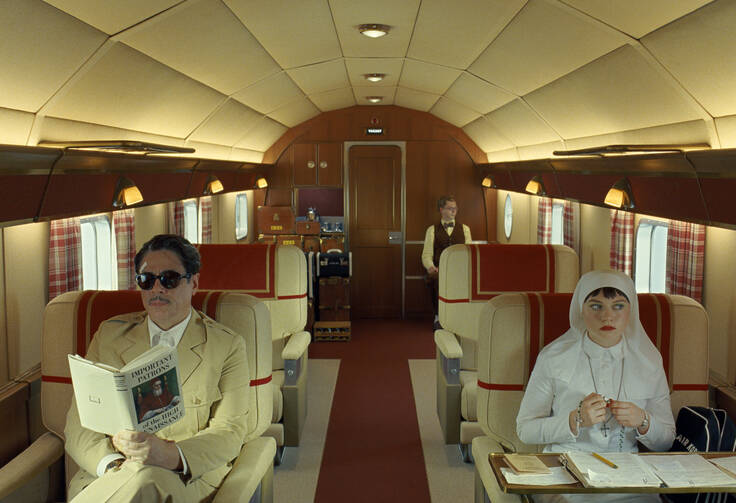“It is easier for a camel to pass through the eye of a needle than for one who is rich to enter the kingdom of God,” Jesus famously tells the disciples (Mt 19:24). Often that is interpreted to mean that a rich person is too weighed down by possessions to embrace the spiritual life. But you could also argue that this is true because their soul is too tarnished by the sins they committed becoming rich in the first place.
For Zsa-Zsa Korda (Benicio Del Toro), the protagonist of Wes Anderson’s new dark comedy “The Phoenician Scheme,” it’s the latter. A midcentury industrialist and war profiteer, Korda amassed his wealth on the suffering of others. He has provoked wars, engineered famines and relied on slave labor, all to line his own pockets. This has earned him countless enemies and assassination attempts, and his face is perpetually scabbed and bruised from the latest saboteur-arranged plane crash he has survived.
Korda emerges from the most recent crash shaken by a near-death visit to a heavenly courtroom. He decides to invest all of his energy into a sprawling infrastructure project in the fictional Middle Eastern kingdom of Phoenicia and names his daughter Liesl—a novice nun at the convent where Korda left her to be raised as a child—as his sole heir. Liesl (a revelatory Mia Threapleton) is committed to her vocation and disgusted by her father’s despicable practices: When he mentions that his project will rely on slave labor, he is perplexed that she recoils. “Is God against slavery, in the Bible?” he asks. But she joins him in order to bring her mother’s suspected murderer, Korda’s sinister half-brother, Nubar (Benedict Cumberbatch), to justice.
Accompanied by an awkward tutor, Bjørn (Michael Cera, such a natural fit for Anderson’s style that it’s shocking he hasn’t been in one of the director’s films before), father and daughter travel to Phoenicia to secure Korda’s investors, a murderer’s row of talent that includes Tom Hanks, Bryan Cranston, Riz Ahmed, Jeffrey Wright and Scarlett Johansson. Along the way they explore their relationship, their competing notions of faith and morality, and try to save Korda’s soul. Compared to the obstacles they face, passing through the eye of a needle looks easy.
Like all Anderson’s films, “The Phoenician Scheme” is meticulously designed: a visual feast of idiosyncratic patterns, lush colors and immaculate framing of actors and set elements. Anderson’s detractors often dismiss his style as meaningless affectation, but nothing could be further from the truth. It always serves a purpose. In “The Grand Budapest Hotel” (2014), it evoked the rich specificity of formative memories and a lost golden age, and in “Asteroid City” (2023) it commented on itself, examining the ways in which we mediate life’s unanswerable mysteries so that we aren’t crushed by their existential weight.
In “The Phoenician Scheme,” the rigorous design implies a grander scheme of which even Korda is only dimly aware, a divine hand guiding him toward a greater purpose. We see him, several times (including during the film’s opening credits), shot directly from above: a God’s-eye view, you might say. When he has near-death experiences he finds himself in a heavenly courtroom, rendered in stark black-and-white reminiscent of the films of Carl Theodor Dreyer. That comparison is thematic as well as aesthetic. This is the closest Anderson has come to making a transcendental film, perhaps the closest he can come. Here his stylistic quirks evoke the spiritual.
“The Phoenician Scheme” does not always live up to the rich promise of its themes. It’s too frenetic, by design, to reach the reflective heights of “Asteroid City” and bears the marks of a much longer film whittled down to an acceptable length (most noticeably in the sequences featuring Johansson and Cumberbatch). But the interplay between Del Toro and Threapleton (and the two with Cera) is more than worth the price of admission, and even a relatively slight Anderson film is richer cinematic fare than much of what’s currently playing.
It is also without a doubt Anderson’s most Christian film to date (the director was, in fact, raised Episcopalian). It’s not just the character of Liesl or all the biblical place names or the scenes where Korda faces a heavenly courtroom. There is also the film’s concern with sin and redemption, the frail but fundamental hope that anyone can be saved if they sincerely repent.
Anderson is known for his portrayal of bad fathers, and Korda might be his most loathsome and destructive paterfamilias to date. It almost feels like a challenge. Everyone can be redeemed? Even this guy? Korda seems dubious himself: Twice Liesl forgives him promptly after he makes shameful confessions, and both times he is perplexed. He is equally flummoxed by her piety and refusal to abandon her vocation to inherit his fortune. When she counters that he was the one who sent her to live in a convent, he says it was to keep her away from boys, adding, “I didn’t expect you to be brainwashed!”
More than any of the austere figures in the heaven scenes, Liesl may be the only divine messenger capable of guiding her father to repentance. At one point she prays, and Korda experiences a miraculous stroke of good luck. Later he asks her how she worded the prayer— not, we sense, out of religious interest, but because he has a habit of exploiting any asset available to him. Liesl tells him that the words don’t matter as much as “the sincerity of your devotion.”
Sincerity is a foreign concept to Korda—there’s no money in it—but that insight might be the key to his salvation. Rich people do good deeds all the time; the rich young man whom Jesus encounters in Matthew, right before the “eye of the needle” bit, makes a point of his good acts. But to sincerely desire the good of others, with no ulterior motive—and, often, at great personal cost—is much harder. It’s a narrow path for a reason: The easy way rarely gets us anywhere worth going.
“The Phoenician Scheme” is now in theaters nationwide.
Correction, June 16: Wes Anderson was raised Episcopalian, not Catholic.








